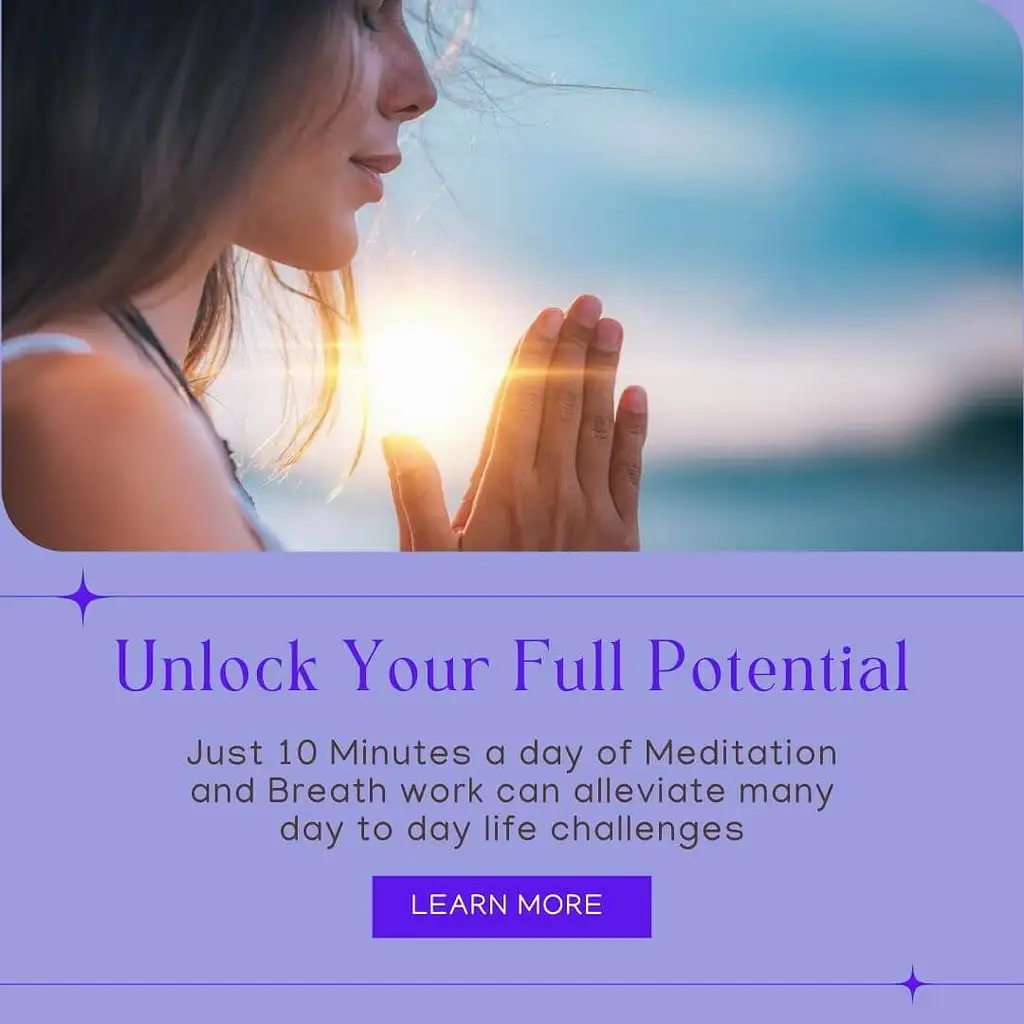We all intuitively understand that the demands of modern life take their toll on our well-being. And that’s why we are turning to meditation to provide a simple and fast way to reduce stress. In this post, we will explore the benefits of meditation, provide a deeper understanding of this ancient practice, and equip you with practical techniques to incorporate meditation into your daily routine.
Meditation: The Simplest and Fastest Way to Reduce Stress
Understanding Meditation
Meditation, with its roots dating back thousands of years, was originally intended to deepen our understanding of the sacred and mystical forces of life. However, in today’s fast-paced world, meditation has become a widely embraced practice for relaxation and stress reduction. As a mind-body complementary medicine, meditation has the remarkable ability to induce a profound state of relaxation and tranquility.
During meditation, you focus your attention and quiet the incessant stream of thoughts that clutter your mind and contribute to stress. By doing so, you cultivate a heightened sense of physical and emotional well-being. It’s a practice that anyone can engage in, regardless of age, background, or lifestyle.
The Benefits of Meditation
Meditation offers a multitude of benefits that can enhance both your emotional well-being and overall health. By incorporating meditation into your daily routine, you can experience a sense of calm, peace, and balance that permeates every aspect of your life. It serves as a powerful tool to help you relax, cope with stress, and maintain inner peace amidst the chaos of daily challenges.
 The benefits of meditation extend far beyond the duration of a single session. Regular practice can help you navigate through your day with a greater sense of serenity and composure. Furthermore, research suggests that meditation may assist in managing symptoms associated with certain medical conditions, making it an invaluable addition to your healthcare regimen.
The benefits of meditation extend far beyond the duration of a single session. Regular practice can help you navigate through your day with a greater sense of serenity and composure. Furthermore, research suggests that meditation may assist in managing symptoms associated with certain medical conditions, making it an invaluable addition to your healthcare regimen.
Meditation and Emotional & Physical Well-being
Meditation holds the key to unlocking a range of emotional and physical benefits. By engaging in this practice, you can:
- Gain a new perspective on stressful situations: Through meditation, you can clear away the mental clutter and information overload that accumulates throughout the day, leading to reduced stress levels.
- Build skills to manage stress: Meditation equips you with valuable tools to effectively manage stress, allowing you to respond to challenging situations with greater resilience and clarity.
- Increase self-awareness: By cultivating a practice of self-reflection, meditation enhances your self-awareness, enabling you to recognize and address negative thought patterns or behaviors that contribute to stress.
- Focus on the present moment: Mindfulness meditation encourages a heightened awareness and acceptance of the present moment. By redirecting your attention to the here and now, you can reduce anxiety and cultivate a sense of calm.
- Reduce negative emotions: Regular meditation practice has been shown to reduce negative emotions such as anger, fear, and frustration. It helps create a positive and harmonious emotional state.
 Boost imagination and creativity: By quieting the mind and fostering a state of relaxation, meditation has the potential to unlock your creative potential and enhance your imaginative faculties.
Boost imagination and creativity: By quieting the mind and fostering a state of relaxation, meditation has the potential to unlock your creative potential and enhance your imaginative faculties.- Increase patience and tolerance: Meditation cultivates qualities such as patience and tolerance, allowing you to navigate challenges and conflicts with a greater sense of equanimity.
- Lower resting heart rate and blood pressure: Scientific studies have indicated that regular meditation can help promote well-being by contributing to a decrease in resting heart rate and blood pressure, promoting cardiovascular health.
- Improve sleep quality: By calming the mind and reducing stress, meditation can enhance the quality of your sleep, leading to improved overall well-being.
Meditation and Illness
In addition to its emotional and physical benefits, meditation can also play a role in managing certain medical conditions. While it is not a substitute for professional medical treatment, meditation can be used as a complementary practice to support overall well-being. Some conditions that may benefit from meditation include:
- Anxiety disorders: Research has shown that regular meditation practice can reduce symptoms of anxiety disorders, such as generalized anxiety disorder, social anxiety disorder, and panic disorder. It promotes a sense of calm and relaxation, helping individuals better cope with anxious thoughts and feelings.
- Depression: Meditation has been found to be effective in reducing symptoms of depression and improving mood. It encourages a positive mindset, fosters self-compassion, and helps individuals develop healthy coping mechanisms.
- Chronic pain: Meditation techniques, particularly mindfulness-based practices, have shown promise in alleviating chronic pain. By redirecting attention away from the pain and promoting a non-judgmental acceptance of the sensations, individuals may experience a reduction in pain intensity and improved pain management.
 Sleep disorders: Regular meditation practice can contribute to better sleep quality and help individuals struggling with insomnia or other sleep disorders. It promotes relaxation and reduces the racing thoughts that often interfere with a good night’s sleep.
Sleep disorders: Regular meditation practice can contribute to better sleep quality and help individuals struggling with insomnia or other sleep disorders. It promotes relaxation and reduces the racing thoughts that often interfere with a good night’s sleep.- Cardiovascular health: Meditation has been linked to improvements in cardiovascular health, including a decrease in blood pressure, heart rate, and the risk of heart disease. By reducing stress and promoting relaxation, meditation supports a healthier heart and blood vessels.
- Chronic illness management: Meditation can be beneficial for individuals managing chronic illnesses such as diabetes, asthma, or autoimmune disorders. It can help reduce stress-related symptoms, enhance coping abilities, and improve overall well-being.
How to Get Started with Meditation
Incorporating meditation into your daily life can be a transformative experience, allowing you to cultivate inner peace, reduce stress, and enhance your overall well-being. By dedicating a few minutes each day to this ancient practice, you can embark on a journey of self-discovery, self-care, and personal growth.
Embarking on a meditation practice is a journey that requires consistency and patience. Here are some steps to help you get started:
- Find a quiet space: Choose a quiet and peaceful environment where you can sit comfortably without distractions.
- Set a time: Allocate a specific time each day for your meditation practice. It could be early morning, during a lunch break, or in the evening—choose what works best for you.
 Start with short sessions: Begin with short meditation sessions, around 5-10 minutes, and gradually increase the duration as you become more comfortable.
Start with short sessions: Begin with short meditation sessions, around 5-10 minutes, and gradually increase the duration as you become more comfortable.- Choose a technique: There are various meditation techniques to explore, such as mindfulness meditation, loving-kindness meditation, or transcendental meditation. Experiment with different techniques to find the one that resonates with you.
- Focus on your breath: A simple and effective technique is to focus your attention on your breath. Observe the inhalation and exhalation, letting go of any intrusive thoughts.
- Be kind to yourself: Remember that meditation is a practice, and it’s normal for your mind to wander. When you notice your thoughts drifting, gently bring your focus back to your chosen point of concentration, whether it’s your breath, a mantra, or an image.
- Seek guidance: Consider joining a meditation class, using guided meditation apps, or seeking guidance from experienced practitioners to deepen your practice and gain additional insights.
- Be consistent: Consistency is key when it comes to meditation. Aim to practice regularly, even if it’s for a short duration. Set realistic goals and stick to them to develop a habit.
- Start small: If you’re new to meditation, don’t feel pressured to meditate for long periods right from the beginning. Begin with shorter sessions and gradually increase the duration as you become more comfortable.
- Integrate meditation into your routine: Find a time that works best for you
and make meditation a part of your daily routine. It could be in the morning to start your day with a clear mind or in the evening to unwind and relax. - Create a dedicated space: Designate a quiet and peaceful space for your meditation practice. This could be a corner of your room, a cozy cushion, or a specific chair that promotes a sense of calm and relaxation.
 Be patient and gentle: Meditation is a practice that requires patience and kindness toward yourself. Don’t expect immediate results and don’t judge yourself for wandering thoughts. Instead, approach your practice with a gentle and compassionate mindset.
Be patient and gentle: Meditation is a practice that requires patience and kindness toward yourself. Don’t expect immediate results and don’t judge yourself for wandering thoughts. Instead, approach your practice with a gentle and compassionate mindset.- Explore different techniques: While focusing on the breath is a common meditation technique, don’t hesitate to explore different methods. Try loving-kindness meditation, body scan meditation, or guided visualizations to find what resonates with you.
- Extend mindfulness to daily activities: Carry the mindfulness and awareness
cultivated during meditation into your daily life. Practice being fully present in the moment during routine activities like eating, walking, or doing chores. - Join a community: Consider joining a meditation group or community. Being part of a supportive community can provide encouragement, guidance, and opportunities for learning and growth.
Remember, the benefits of meditation are cumulative, and progress happens over time. If you embrace the process, remain open to the experience, and allow yourself to discover the transformative power of meditation in your life, you will definitely reap the benefits that regular meditation brings.
Conclusion
Meditation is a powerful practice that offers numerous benefits for your mental, emotional, and physical well-being. From reducing stress and anxiety to improving focus and cultivating a sense of inner peace, meditation can positively impact your overall quality of life. By incorporating meditation into your daily routine and making it a priority, you can embark on a journey of self-discovery, personal growth, and a deeper sense of connection to the world around you.
Why not begin your journey today by learning the 2 biggest secrets to meditating that make it easy?




